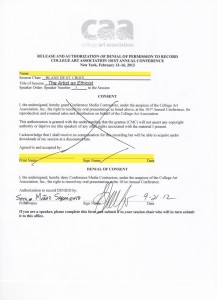When Intellectual Labor Goes Uncompensated
It’s one thing for education institutions to own a teacher’s product, both tangible and intangible, but we’re not in agreement that the same principle should apply to student work. After all, students aren’t employees. The Washington Post reports,
The board of education for Prince George County in Maryland is apparently considering a new “copyright policy” in which all students and staff would have to assign all of those copyrights over to the school system itself.
As to the policy,
“Works created by employees and/or students specifically for use by the Prince George’s County Public Schools or a specific school or department within PGCPS, are properties of the Board of Education even if created on the employee’s or student’s time and with the use of their materials,” … “Further, works created during school/work hours, with the use of school system materials, and within the scope of an employee’s position or student’s classroom work assignment(s) are the properties of the Board of Education.”
This is not simply ridiculous and extremist, it’s unethical and probably illegal. We’re not sure you can force, or coerce, a creative individual into giving away her intellectual property rights.
The issue of compensation is dear to us, given the rampant exploitation in the so-called “art world” of uncompensated labor, intellectual and otherwise. It’s one thing to have a school board or board of directors aggressively claim ownership to an artist’s creative output, but when it’s other artists or arts administrator, that’s another thing. Neither is ethical or conducive to a sound policy of remuneration for one’s intellectual or physical labor, but when it is perpetuated and enforced by fellow artists and academics, that smells a bit like the house slave mentality.
Recently, yours truly withdre w from a College Art Association (CAA) panel in New York City, organized by Blane de St. Croix, due to similar circumstances. CAA had, as a prerequisite, that any presenters to a CAA panel must pay CAA membership dues to present their work on a panel to which they had been approached to participate in. Additionally, the speakers were not compensated for their participation. This was bad enough, but at first I opted to participate due to my friendship with the organizer, Blane de St. Croix. However, when I was finally asked to sign a release form granting CAA the right to audio record my presentation (see below) and grant CAA the right to sell and distribute my audio presentation without remuneration to me was, as some would say, the straw that broke the camel’s back. I suppose the only “perk” to this property grab was that I could purchase my own audio recording at a “discounted rate.”
w from a College Art Association (CAA) panel in New York City, organized by Blane de St. Croix, due to similar circumstances. CAA had, as a prerequisite, that any presenters to a CAA panel must pay CAA membership dues to present their work on a panel to which they had been approached to participate in. Additionally, the speakers were not compensated for their participation. This was bad enough, but at first I opted to participate due to my friendship with the organizer, Blane de St. Croix. However, when I was finally asked to sign a release form granting CAA the right to audio record my presentation (see below) and grant CAA the right to sell and distribute my audio presentation without remuneration to me was, as some would say, the straw that broke the camel’s back. I suppose the only “perk” to this property grab was that I could purchase my own audio recording at a “discounted rate.”
As with the Maryland School Board above, I strongly believe that an organization like CAA, which, presumably is in the business of helping artists and arts academics, should not financially and culturally benefit off the intellectual labor produced by those it portends to help without remuneration to those same producers. At some point, we, creative producers of all kinds, will have to believe that what we do does take time, effort, and know-how, and demand that we be compensated for our labor, of any kind.
Tags: academic, art, artist, assignment, CAA, collega art association, Copyright, employee, intellectual labor, law, Property, sergio munoz sarmiento, student



Comments